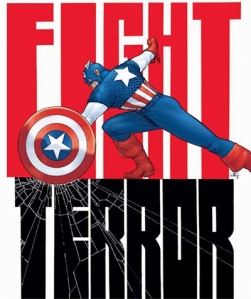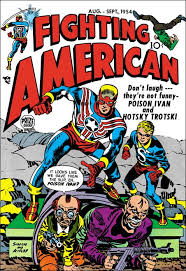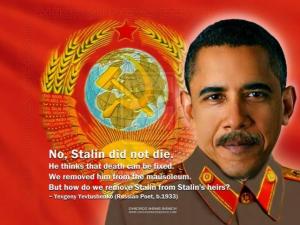Is the War on Terror over yet? It was written to be a mini-series. After the 2003 fall of Baghdad, Secretary of Defense Rumsfeld outlined plans for an immediate invasion of Syria. Lebanon, Somalia, and Sudan were up afterwards, with Iran crowning the Bush Administration’s “seven countries in five years” plot.
It was a naive story, one modeled on World War II and the swift collapse of the Axis. A decade later, the American public can’t even stomach Syrian air strikes let alone a ground invasion. We would all like the War on Terror to be over, but it’s evolved instead. Now we’re stuck with a less combative but never-ending Cold War on Terror.
That could prove a problem for superheroes. Costumed crusaders make lousy diplomats. Captain America would just infiltrate those Syrian chemical depots. The Human Torch would take out Iran’s nuclear plants with a few fire balls. The Sub-Mariner wouldn’t negotiate with Russia; he’d fly in and grab Snowden by the throat.
It will take a few Hollywood mega-flops before superheroes change their big screen tactics, but I predict that change is coming too. Just look at the last time America’s legion of leotards faced a cooling of national attitudes.
1954 should have been a good year for superheroes. Sure, the plummet in post-war sales wiped most superpowers off newsstands, but the Man of Steel had made the leap to TV. The first two seasons of Adventures of Superman were looking like a hit for ABC. No wonder Atlas (formerly Timely, soon Marvel) Comics decided to revive their golden age sellers. Joe Simon and Jack Kirby’s Captain America cranked out a million copies a month during the war, with Sub-Mariner and the Human Torch right behind. Now the three were fronting their own magazines again. The Torch even returned atomic-powered, a happy side effect of the nuclear testing that awakened him from his desert grave.
Over at DC, superheroes hid on the home front during World War II. Except for a smiling, patriotic splash page selling bonds, you wouldn’t have known there was a war on. That’s part of why DC’s trinity—Superman, Batman, Wonder Wonder—were the only supers to survive the post-war plummet. They stayed out of Cold War politics too. The Man of Steel never came near the Iron Curtain. Instead of bashing Commies, Adventures of Superman softened Superman’s crooks into cartoonish comedy. DC stapled “the American way” to the old “truth and justice” credo, and that’s as far as the Red Scare crept into Superman’s true blue tights.
But at Atlas, superheroes remained bound to America’s real-world supervillains. So with Hilter, Mussolini and Hirohito vanquished to the Phantom Zone, they used the Cold War substitute. Sure, Joseph Stalin was dead, but Soviet sickles and hammers still replaced swastikas on Sub-Mariner’s first cover. Captain America stands with his shield raised in a self-congratulatory cheer below his new 1954 tag phrase “Commie Smasher!”
It made sense. Joseph McCarthy’s communist-vilifying absolutism was a good fit for unexaminedly violent supermen populating a patriotically distorted fantasy world of pure good and evil. The timing was right too. McCarthy’s popularity popped in 1950 with his never-substantiated charge that the State Department was infested with Communists. When Washington Post cartoonist Herbert Block coined the pejorative term “McCarthyism,” the Senator embraced it. His 1952 McCarthyism: The Fight For America even linked Communism to Hitler.
Atlas wasn’t the only comic book company backing McCarthy. Prize Comics hired Simon and Kirby to revive their brand of patriotic violence with another star-chested super soldier. Simon had titled his original Captain America sketch “Super American,” but he and Kirby went with Fighting American for their Cold War redo. Doing Captain America’s resurrection one better, Fighting American was literally a corpse, a dead World War II hero and right wing TV commentator reanimated and inhabited by his puny kid brother. And that’s the best definition of “MyCarthyism” you’ll even find.
So why didn’t any of these superpowered pinko-pounders last even a year? Captain America and the Human Torch went down in flames after just three issues. Sub-Mariner dribbled out ten. Stan Lee blamed the flop on the “stridently conservative scripting,” the same script McCarthy was working from. As a Senate chairman, he accused the U.S. Army of harboring masked Commies, and so the Army-McCarthy hearings kicked off in April 1954. On newsstands the same month, the first cover of Fighting American boasted: “Where there’s Danger! Mystery! Adventure! We find The NEW CHAMP OF SPLIT-SECOND ACTION!” The hearings ended in June, the cover date of the last issue of Human Torch. The last Captain America was removed from newsstands the following month. Which means Atlas made its cancellation decisions during the hearings. Commie-bashing superheroes fell with their Commie-bating role model.
Instead of cancelling, Kirby and Simon went a different but equally anti-McCarthy direction. June-July is the last non-satirical issue of Fighting American. Prize introduced a redesigned logo for August-September, and the new cover includes two clownish communist villains and the ironic warning: “Don’t laugh—they’re not funny—POISON IVAN and HOTSKY TROTSKI.”
Jingoistic superheroism was literally a joke. The Senate condemned McCarthy in December, while Fighting American joked his way into Spring. Simon and Kirby had an eighth issue ready, but Prize never printed it. When McCarthy died in 1957, he stayed dead too. Captain America rose a decade later, but he was a changed man. Marvel even declared that 1954 guy an impostor. Stan Lee said he wanted to express his own “ambivalent feelings” through the new Captain and “show that nothing is really all black and white.” Or white and Red.
If history repeats itself, superheroes will be a joke again soon. But first our contemporary McCarthies and their “stridently conservative scripting” would have to flop. The GOP’s polls plummeted after the shutdown, but Senator Cruz and his Tea Party cohorts look fine in their gerrymandered districts. According to his filibuster transcript, Cruz even believes he’s a member of the Rebel Alliance fighting the Evil Empire in Star Wars. It’s not a comic book, but the two-dimensional thinking is the same. The Tea Party is happy as long as they have that pinko Obama to bash in the name of the American way.




